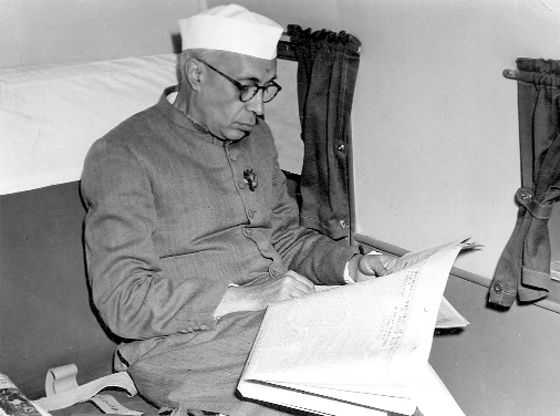Avijit Pathak
Sociologist
On Jawaharlal Nehru’s birth anniversary, I feel like asking a pertinent question: What does it mean to look at the project of modernity he visualised for redefining the identity and aspirations of a new India? I ask this question for two reasons. The first is that these days — characterised by a mix of market-driven technocratic rationality and militant cultural nationalism — does the discourse of Nehruvian modernity look somewhat odd or irrelevant? Secondly, when in the larger socio-philosophical debate— enriched by romantic poets, critical theorists and environmentalists — we see sharp reflections on the discontents of modernity, from ecological disaster to cultural/psychic violence all around, what does it mean to revisit Nehru?
Well, any careful reader of Nehru’s classic text The Discovery of India would concede that Nehru’s modernity was not altogether indifferent to the flow of Indian civilisation: its long and curved history, its socio-cultural matrix, its epics, religious traditions and spiritual debates, its darkness and prejudices, and its contradictions and possibilities. As a wanderer and seeker, driven by the extraordinary urge to understand the core values of the old civilisation as well as the critical urge to alter the ‘dead weight of past’, he evolved his philosophy of modernity. Moreover, as The Glimpses of World History would indicate, he was heavily influenced by the remarkable changes that the modern West experienced because of the techno-scientific revolution, and the emergent practices and philosophies of socio-political liberation. Neither Charles Darwin nor Vladimir Lenin could escape his attention. Hence, it would not be wrong to say that with a nuanced historico-cultural sensitivity and even metaphysical wonder, he formulated the blueprint of the project of modernity.
And I think that there are three central pillars of this project.
First, it stressed heavily on ‘scientific temper’as a way of thinking, seeing, acting and associating with society. Possibly, the age-old burden of priestcraft and associated fatalism, fear and superstitions, he felt, were obstacles to be overcome; and science with its reason, empiricism, objectivity and argumentative culture would help us to come to terms with the new age.
Second, he cherished the gospel of ‘progress’ — a state of material prosperity through massive industrialiation and scientific development.
Third, he wanted the modern state — driven by some sort of secular/welfarism ethos — to play an active role in modernising our society, or creating a new intellectual force as ‘legislators’ of modernity through the establishment of new centres of learning and research; it was also an attempt to consolidate the foundations of Indian nationalism based on cultural pluralism, a broadly pan-Indian consciousness, and some sort of federal structure with a delicate balance between the Centre and the states.
It is for the historians and political analysts to evaluate Nehru’s achievements and failures. However, as I look at contemporary times, I feel that the Nehruvian worldview has been severely demolished by the ruling regime. For instance, in Nehru’s celebration of science, there was a spirit of wonder, an urge to sharpen critical consciousness and the faculty of reason. These days, the liberating potential of science has been replaced by what I would regard as an infatuation with technocracy; and as a result, there is the celebration of purely instrumental rationality which promotes the interests of the neoliberal/profit-oriented corporate culture. With ‘techno-miracles’, science seems to have been hijacked by the market. Furthermore, the argumentative character of science has been replaced by a high degree of toxic social conservatism based on faith and identity. From cow vigilantism to mob lynching, or from the cacophony of Jai Shri Ram to the celebration of Ganesha’s ‘plastic surgery’, we see the death of science.
Likewise, the ideals that shaped Nehru’s nationalism — a spirit of non-alignment filled with socialist sensibilities, a cosmopolitan outlook, and a reasonable degree of restraint regarding the manipulative use of religion in public life — are in danger. The collapse of socialism, the triumphant neoliberal capitalism, the rise of right-wing nationalism, and the new revival of racist/casteist/religious doctrines in the political culture: in a world of this kind, as a cynic would argue, there is no scope for Nehru’s intellectual romance with Marx and Einstein, or Ashoka and Akbar.
Well, I do admit that Nehru was influenced by the optimism inherent in the grand Enlightenment project of modernity. And today, as social philosophers argue, it is difficult to sustain this optimism. As we see the arrival of a ‘risk society’ threatened by war and climate change, or the growth of a media-induced hyper-real spectacular culture of consumerism with its own mechanism of social control, and eventually a surveillance-oriented society damaging the spirit of freedom and trust, the project of modernity doesn’t look so promising. Possibly, with his own characteristic way, Gandhi could visualise this danger. And Nehru (even though closely attached to Gandhi), as his Autobiography indicates, could not always appreciate this Gandhian wisdom as articulated in the Hind Swaraj, or the Mahatma’s insistence on austerity and skepticism towards our over-indulgence with modern machineries.
However, in our times, those who are part of the ‘Nehru-bashing’ industry have neither the Gandhian wisdom (it is not possible for the devotees of Savarkar and Godse) nor the honesty to understand the politico-historical context — I mean the historicity of a newly independent nation trying to come out of the trauma of Partition, striving for a unitary principle based on the coexistence of multiple faiths, and trying to generate the infrastructure needed for removing poverty and illiteracy — that led the first Prime Minister of the country to pursue his project of modernity. Instead, in a reckless attempt to construct the imagery of a new avatar correcting all the ‘misdeeds’ perpetuated by ‘pseudo-secularists’, they seek to evade even the slightest trace of Nehru from our collective memory. Is it tragic or comic?
Unlock Exclusive Insights with The Tribune Premium
Take your experience further with Premium access.
Thought-provoking Opinions, Expert Analysis, In-depth Insights and other Member Only Benefits
Already a Member? Sign In Now










